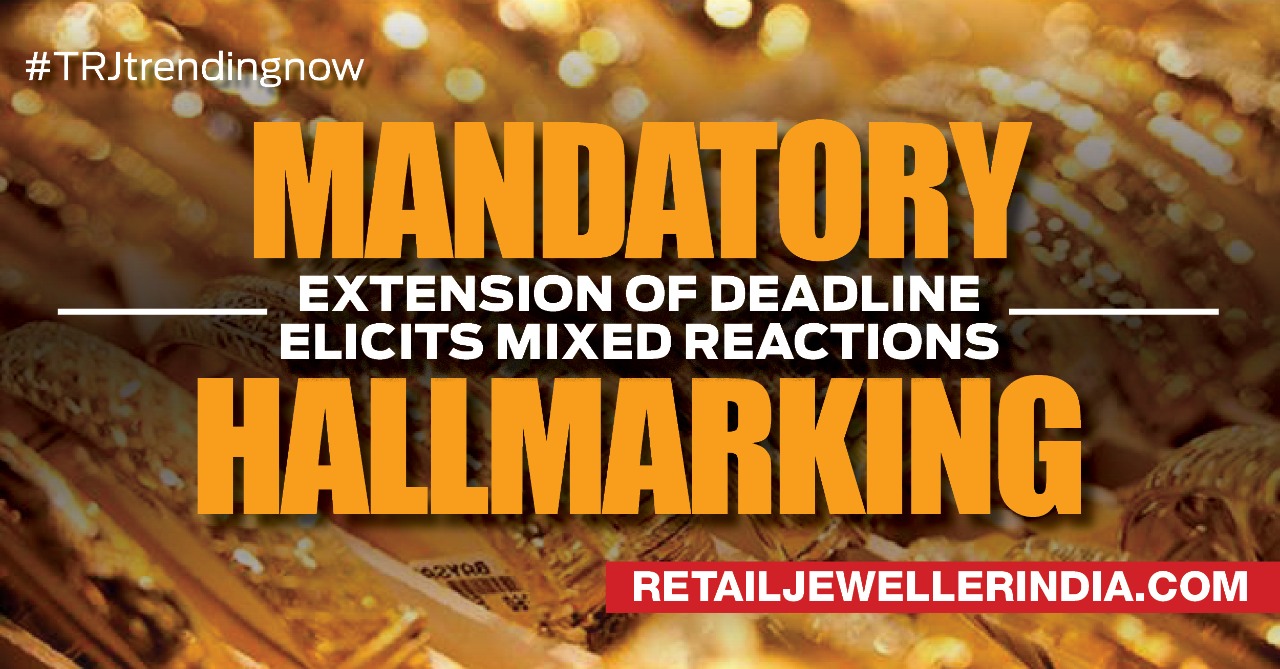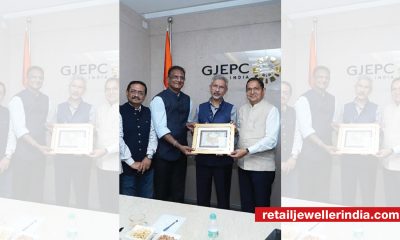Prime Story
Mandatory hallmarking: Extension of deadline elicits mixed reactions

by Suneeta Kaul
Union Consumer Affairs Minister Ram Vilas Paswan recently announced that the deadline for mandatory hallmarking of gold jewellery and artefacts would be extended by over four months to June 1, 2021, in the wake of the ongoing COVID-19 pandemic. In November 2019, the Centre had announced that hallmarking would be mandatory across the country from January 15, 2021. While this might seem like a relief measure provided to the jewellery industry, retailers and industry bodies have mixed reactions to the announcement.
Four-month extension not enough?
The government came out with an official notification about mandatory hallmarking in January this year, thus giving the industry a year to make the transition to hallmarking and register with the Bureau of Indian Standards (BIS). Unfortunately, the COVID pandemic changed the industry dynamics, and the lockdown resulted in a prolonged period of inactivity. Keeping this in mind, the Centre offered to extend the deadline, but the industry does not seem to have a unanimous view on whether the extension will serve the purpose.

Says Asher O, MD, Indian Operations, Malabar Gold and Diamonds, and also the Chairperson, Sub-Committee for Hallmarking and Certification, CII Task Force, “The extension of the date of mandatory hallmarking is a much-needed reprieve for the industry, as a lot of time was lost because of the pandemic. Many players were unable to move towards mandatory hallmarking, with the overall shortage of hallmarking centres making things even more difficult. Now that hallmarking has been made mandatory, it will be prudent for all industry players to plan accordingly and take quick action to ensure that all products are hallmarked. If this is fast-tracked, all jewellers will be able to meet the stipulated deadline; if it is prolonged, then the industry will not be able to comply with the order.”
Though BIS has been running a hallmarking scheme for gold jewellery since April 2000, only about 40 per cent of jewellery is hallmarked, as of now. While the government order on mandatory hallmarking has been welcomed by almost all industry players, not everybody is convinced that a four-month extension is enough time for jewellers to get their entire stock hallmarked.

According to N Anantha Padmanaban, Chairman, All India Gem and Jewellery Domestic Council (GJC), “While we welcome the government order to extend the date of mandatory hallmarking of jewellery, a four-month extension is not sufficient. The industry has suffered greatly due to the pandemic, and we need at least another six months’ extension of the deadline. We will not be able to change 100% of our stock by June 2021. We need time till January 2022.”

Agrees Vikram Verlekar, Managing Director, Ulhas Jewellers, “The government’s move to extend the mandatory date by just four months is an unfeasible move that will definitely affect the industry. The COVID pandemic has created an unprecedented socio-economic crisis, and the industry is facing lot of challenges. My advice to the government is to extend the date further to a time when things normalize for the industry, and when BIS has proper mechanisms in place to handle the huge demand of hallmarking.”
Infrastructure and policy issues
The move towards mandatory hallmarking is further compounded by the shortage of hallmarking centres in the country. Some jewellers are of the view that the government should first put the requisite infrastructure in place first, and only then introduce mandatory hallmarking.

“We do not have enough hallmarking centres to service the requirements of the nation,” says Vijay Khanna, Director, Khanna Jeweller Pvt Ltd, adding, “Some North Eastern states do not have any hallmarking centre. BIS needs to work with the industry to formulate a plan with milestones for infrastructure development before the government proposes mandatory hallmarking.”
Additionally, industry players and bodies say the government has to be more educative about the advantages of hallmarking, and the role each stakeholder has to play. “The government and the BIS need to make an effort to bring about greater awareness among the public regarding the benefits of buying only hallmarked jewellery. Moreover, BIS has to work closely with manufacturers, wholesalers, retailers, hallmarking centres, and so forth, to ensure that all stakeholders are aware of what they need to do, and how they can prepare themselves for mandatory hallmarking,” adds Asher.
Some jewellers are not in agreement with the government order regarding the purity of gold jewellery that can be sold, once the mandatory hallmarking order kicks in. Says Khanna, “The notification that only 14, 18 and 22 carat jewellery can be sold is very limiting. It does not take into consideration the desire of those customers who might want to buy 9, 10, 19, 20, 23 or 24 carat jewellery. Besides, the new hallmarking policy does not clarify whether the hallmarking charges attract a different GST rate.”
In the end, hallmarking is inevitable, and has been welcomed by practically all industry players. However, lingering doubts in sections of the industry about the time period given to it to comply with the policy directive is something the Centre might need to look into.
Courtesy:Retail Jeweller India News Service.






 Daily News1 month ago
Daily News1 month agoBvlgari adds designs to its pathbreaking mangalsutra collection ahead of wedding season

 Daily News4 weeks ago
Daily News4 weeks agoTrent, a TATA subsidiary, launches lab-grown diamond brand ‘Pome,’ shares surge 7.67%

 Daily News4 days ago
Daily News4 days agoSavji Dholakia’s visionary water conservation project ‘Bharatmata Sarovar’ reinforces commitment to sustainability

 Exclusive2 weeks ago
Exclusive2 weeks agoFirefly Diamonds makes a bold entry into Mumbai’s luxury retail scene with R City Mall store






















